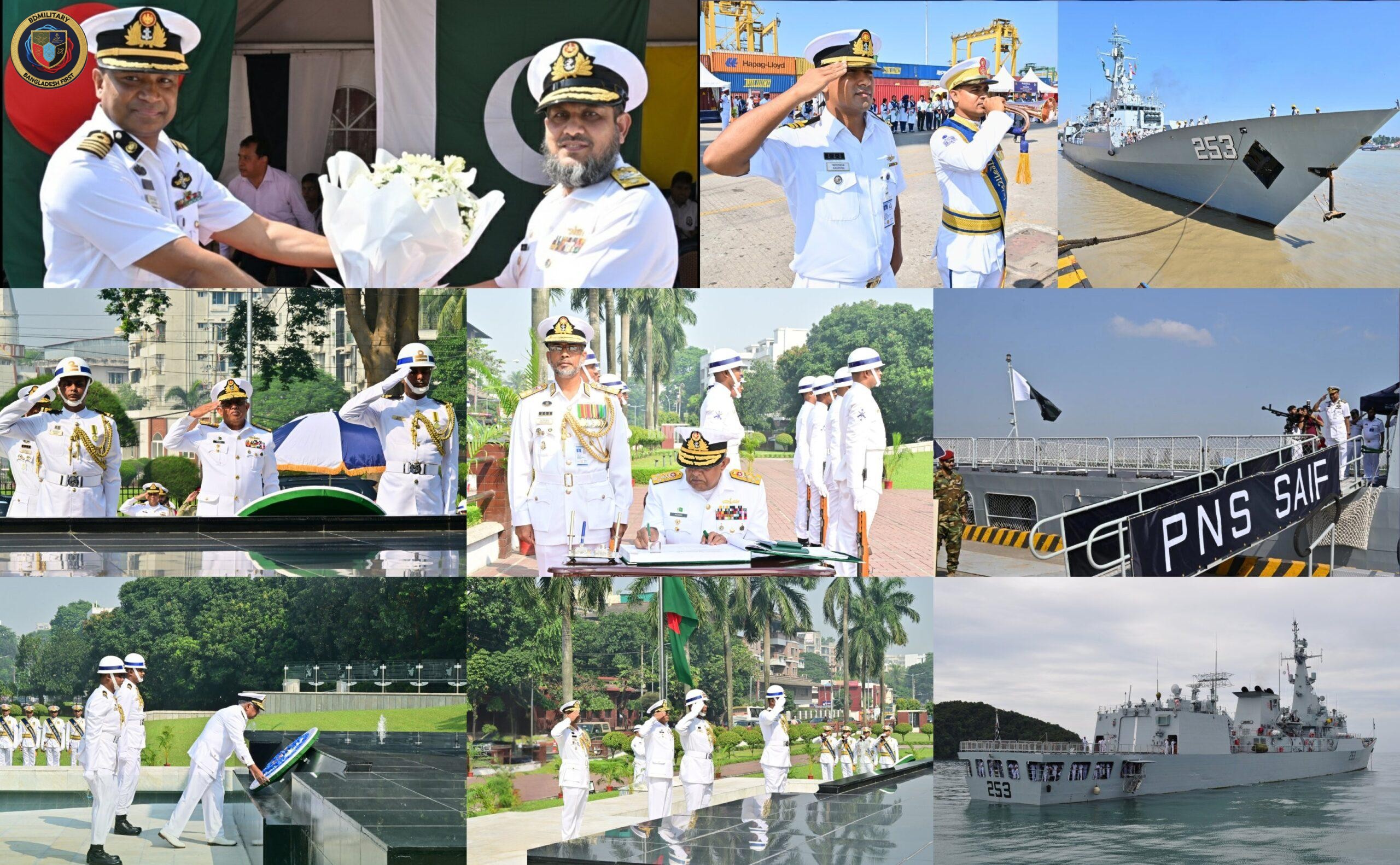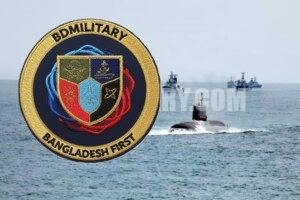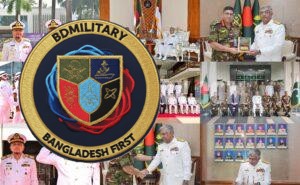A Historic Port Call
In a development that signals a significant milestone in South Asian naval diplomacy, the Pakistan Navy frigate PNS Saif (FFG-253) arrived at Chattogram Port on 8 November 2025 for a four-day goodwill visit to Bangladesh. The frigate, commanded by Captain Shujaat Abbas Raja, was ceremonially received by officers of the Bangladesh Navy on behalf of the Commander, Chattogram Naval Area. Senior naval officials and representatives from the Embassy of Pakistan in Dhaka were present at the welcoming ceremony. Earlier, upon entering Bangladeshi territorial waters, Bangladesh Navy Ship BNS Shadhinota greeted and escorted the visiting vessel with full honours, symbolising mutual professional respect and maritime courtesy.
This visit marks the first time in more than five decades that a Pakistani warship has called at a Bangladeshi port. For both countries, the occasion carries deep historical resonance and points toward a gradual warming of professional military relations after years of limited direct contact.
The Ship and Its Significance
PNS Saif is a Zulfiquar-class guided-missile frigate of the Pakistan Navy, built at Hudong-Zhonghua Shipyard in Shanghai and commissioned into service in 2010. The 3,000-ton vessel is a versatile combat platform equipped for anti-surface, anti-submarine, and limited area-air defence operations. As one of Pakistan’s modern frontline frigates, Saif forms part of a four-ship class that represents the country’s long-standing industrial partnership with China in naval construction.
The frigate’s arrival in Bangladesh underscores Pakistan’s ongoing maritime diplomacy and its effort to extend naval engagement eastward into the Bay of Bengal. The Pakistan Navy has undertaken similar goodwill port calls in Sri Lanka, Oman, Malaysia, and Indonesia in recent years, reflecting a consistent strategy of fostering regional partnerships and cooperative maritime security.
Admiral Naveed Ashraf’s Parallel Visit
Coinciding with the ship’s deployment, the Chief of the Naval Staff of Pakistan, Admiral Naveed Ashraf, arrived in Dhaka on an official four-day visit from 8 to 11 November 2025. During his stay, the Admiral is meeting with his Bangladeshi counterpart Admiral M. Nazmul Hassan, holding discussions with senior officials of the Ministry of Defence and the Armed Forces Division, and visiting naval facilities in Chattogram.
The visit also includes ceremonial events such as the presentation of a Guard of Honour at Naval Headquarters in Dhaka, courtesy calls, and cultural engagements hosted by the Bangladesh Navy. The timing of Admiral Ashraf’s visit alongside PNS Saif’s port call demonstrates a deliberate diplomatic synchronisation aimed at strengthening professional ties and exploring potential cooperation in training, hydrography, and non-traditional maritime security domains.
Strengthening Professional Ties
Over the four-day visit, officers and sailors from both navies are engaging in professional exchanges, ship tours, and social events designed to build mutual understanding. The crew of PNS Saif is scheduled to visit local naval establishments, take part in sports and cultural activities, and pay respects at the National Martyrs’ Memorial. Such goodwill interactions are an essential part of naval diplomacy, allowing officers to observe each other’s operational methods and command culture in an atmosphere of cooperation rather than competition.
For Bangladesh, which continues to modernise its maritime forces under the framework of Forces Goal 2030, exposure to diverse naval doctrines and operational practices offers valuable professional insight. The Bangladesh Navy’s increasing participation in bilateral and multilateral exchanges has become a hallmark of its outward-looking defence policy, aimed at building capacity and credibility across the Indo-Pacific region.
Symbolism and Strategic Context
The symbolism of PNS Saif’s visit extends beyond naval courtesy. Since the early 1970s, Bangladesh and Pakistan have maintained minimal direct defence interaction, limited mostly to multilateral forums such as the Indian Ocean Naval Symposium and the AMAN series of multinational maritime exercises hosted by Pakistan. The presence of a Pakistani frigate in Chattogram therefore represents a tangible step towards rebuilding institutional familiarity between the two naval forces.
For Dhaka, the engagement reflects its pragmatic policy of diversification. Bangladesh has expanded its defence and security partnerships with China, Türkiye, South Korea, and Indonesia, while maintaining measured relations with India and the United States. In this context, the arrival of PNS Saif can be viewed as part of Bangladesh’s broader strategy of balancing relationships in a complex regional environment without compromising its national interests.
For Islamabad, the visit demonstrates a renewed effort to project soft power through naval diplomacy and to establish a cooperative presence in the eastern reaches of the Indian Ocean. By engaging with Bangladesh, Pakistan not only seeks to revive a historical link but also to expand its diplomatic reach in a maritime region that is becoming strategically significant due to trade routes, blue-economy interests, and security challenges such as piracy, trafficking, and illegal fishing.
Regional Sensitivities
Although the visit has been widely described as a goodwill gesture, regional observers note its broader implications. Indian media coverage has highlighted the event as historic yet strategically sensitive, given the longstanding rivalry between India and Pakistan and the evolving security landscape of the Bay of Bengal. For Bangladesh, the careful management of such interactions is essential. Dhaka continues to assert its right to conduct sovereign defence diplomacy while ensuring that no engagement undermines its regional stability or its bilateral ties with any neighbouring state.
By hosting a Pakistani naval ship and its Chief of Naval Staff, Bangladesh has effectively projected itself as a confident and independent maritime nation capable of engaging with multiple partners in pursuit of professional cooperation and regional peace.
Looking Forward
The goodwill visit of PNS Saif and the concurrent presence of Admiral Naveed Ashraf may serve as a foundation for more structured cooperation between the Bangladesh Navy and Pakistan Navy in the coming years. Areas such as professional training, hydrographic survey collaboration, participation in multinational exercises, and maritime domain awareness could provide avenues for practical engagement.
For Bangladesh, whose naval expansion under Forces Goal 2030 aims to develop a blue-water capable fleet, cultivating multiple lines of dialogue helps reinforce its maritime resilience and policy of non-alignment. For Pakistan, deepening ties with Bangladesh offers diplomatic and symbolic value in expanding its outreach in the Bay of Bengal, a region increasingly important to Indian Ocean security.
Remarks
The arrival of PNS Saif at Chattogram and the simultaneous visit of Admiral Naveed Ashraf together mark a notable turning point in Pakistan–Bangladesh naval relations. Beyond ceremony, these interactions embody a pragmatic shift towards renewed professional understanding and cooperative engagement. For Bangladesh, it affirms a foreign policy rooted in sovereignty, balance, and diversification. For Pakistan, it demonstrates an effective use of naval diplomacy to reconnect with a key South Asian neighbour after decades of distance.
In the broader maritime landscape of the Bay of Bengal, such engagements signify the gradual emergence of Bangladesh as a confident regional actor pursuing stable, multidirectional partnerships in support of its national and maritime interests.


